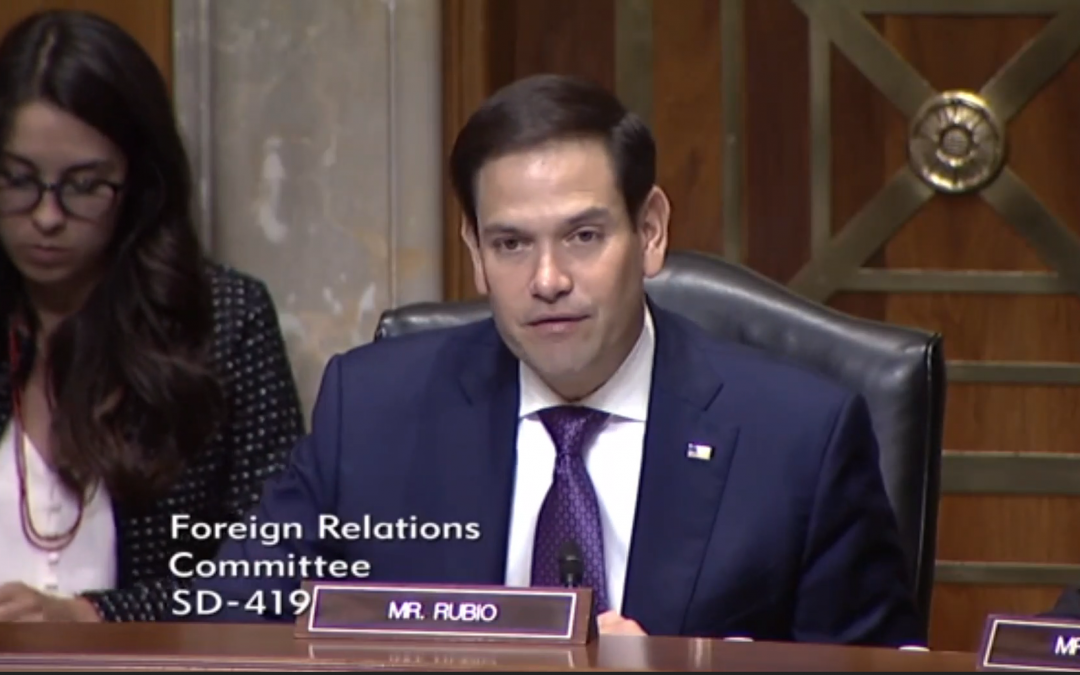
Securitas’ Pamela Bates U.S. Senate Nomination Hearing for Ambassador to the OECD


Securitas Global Risk Solutions is pleased to note that it will once again be participating in the 2019 EXIM Conference, to be held at the Omni Shoreham Hotel in Washington, DC from March 28-29, 2019. The annual event showcases the work of the EXIM Bank and brings together over 1000 business leaders, government officials and foreign dignitaries from across the world with an interest in promoting U.S. exports.
The EXIM Bank is an independent and self-sustaining federal agency that provides a range of trade financing solutions – including loan guarantees, working capital guarantees, direct loans, and export credit insurance – to promote the sale of U.S. goods and services to foreign buyers. To learn more about the range of products offered by the EXIM Bank, click here.
The focus of this year’s conference will be the role of trade in promoting national security, as well as highlighting EXIM’s role in assisting American energy and manufacturing sectors. The program will include keynote speeches, panel discussions, as well as ample networking time for participants to discuss best practices, and export opportunities.
As a certified EXIM broker, Securitas assists U.S. exporters to identify, implement and manage the appropriate EXIM export trade credit insurance program to meet their goals of sustained and secure long-term growth. Securitas provides these services at no additional cost to the exporter. In 2015, Securitas was named EXIM Broker of The Year.
Securitas is ready to help businesses, particularly small and medium-sized enterprises (SMEs) interested in pursuing an export strategy and learn how to access EXIM’s export trade credit insurance programs.

Risk management often requires a counter-intuitive approach, challenging ourselves to think through whether we have accurately assessed the possible risks that face our businesses. Planning for a range of outcomes requires an evaluation of downside risk. This runs counter to the optimistic view we naturally have for our efforts in building individual enterprises. Yet the recent bankruptcy of Toys-R-Us highlights why, even when times are good and indicators seem positive, “black swan” events can happen. The time to plan for those events is ahead of the crisis.
Imagine the scenario: It is August 2017. As the CEO of a toy manufacturing company, your firm is coming up on the biggest, most lucrative season of the year – the December holidays. Irrespective of tradition, the bringer of gifts will need some 21st century manufacturing support — your toy company is just the one for the job!
Knowing the retail toy sector is largely seasonal, your company team understands the traditionally longer manufacturing lead times needed to stock store shelves. They have worked hard, marketed and won contracts from the major toy retailers in advance of the big season. Your company also anticipated the early holiday shoppers and made sure products will be delivered by the middle of September. It is this holiday-season Accounts Receivable that will fund your firm’s working capital throughout a good portion of next year.
Now ask the question: Do you need trade credit insurance on those Accounts Receivable? Is it a luxury or a necessity? There is market concentration with a historically large buyer that could not possibly file for bankruptcy right before the holiday season, the best time of the year. You decide to gamble with that thought in mind.
Your CFO, however, has been reading the trade press on the difficulties facing the retail sector, as the major box stores wither under cost competition from online retailers. She recommends you take a look at insuring buyer risk, just in case retailing has indeed crossed a Rubicon and become an online enterprise. The is not really the news you want to hear going into the busiest season of the year — but then again, you made her CFO because she is willing to bring you the hard news. With a quick call to your broker, you are able to line up a trade credit solution covering the risk concentration associated with a large buyer. As it turns out, this one call can be the move that saves your toy company. Unlike many of your competitors, you will now get paid for the shipped merchandise.
When everything is going well, accounts receivable are being paid and aging accounts are small, trade credit insurance might look like a luxury. However, it is also a good time to review your options and risks with an experienced trade credit insurance expert at Securitas Global. The premium rates can be lower with greater underwriting capacity. Even more importantly, markets recognize the value of supporting existing clients on credits like Toys “R” Us. Just prior to the bankruptcy filing, our Securitas Global team heard comments from vendors with respect to getting trade credit insurance on Toys-R-Us that included: “It’s expensive” and “We’re concerned, but we don’t think they’ll file yet.” When it became clear there would be a loss, and insurance was no longer available since underwriters will not insure a certain loss, the cost of protection became secondary. The conversation became one of whether any available coverage options existed.
The moral of the story: The time to put trade credit insurance in place is before there is a known risk. As one client shared “I have too much invested in my business to risk it because one of my customers can’t pay me.” Securitas Global can develop a customized solution to cover your needs at the right price point. We work with clients to determine their level of risk and how to allocate it then devise a policy that will cover their specific needs. This can include coverage for overseas buyers and ways to mitigate political risk. By insuring accounts receivable, we are able to preserve your firm’s working capital and support credit access.
Please join us on Nov 19th in Camden, NJ at the Export Finance Workshop facilitated by the World Trade Center of Greater Philadelphia. Please register at WTCGP website.
FOR MORE INFORMATION, CONTACT:
Susan Mills Farrington Office Manager & Membership Coordinator 215.586.4240 |
|
Do not miss this opportunity to meet the region’s leading trade finance lenders and government finance representatives.
Receive the latest information on financing programs available with U.S. government backing from the Export – Import Bank of the United States and the Small Business Administration. You will also hear from companies like yours who have successfully utilized this financing to grow their international business.
Who should attend?
CEOs, CFOs, and international marketing managers of export-ready companies
You will learn how to:
|
|
Most Americans did not expect the quick succession of events in Ukraine leading to the removal of President Viktor Yanukovych or the emergence of Crimea as a flashpoint in Ukraine-Russia relations. The situation in Crimea is just the most recent example of how quickly and unexpectedly the international political and economic landscape can change. These changes can adversely impact U.S. business people and investors who have exposure in places such as Russia and Ukraine.
For example, the U.S. and EU have introduced a series of selective sanctions against Russia and some individuals for their role in the current crisis but have indicated that broader sanctions against certain sectors of the Russian economy are possible. Russia has responded by putting a travel ban in place for several American officials. One of the Russians included in the U.S. sanctions, parliamentarian Andrei Klishasa, went further- introducing a bill to allowing for the confiscation, expropriation and nationalization of western assets in response to these U.S. / EU sanctions although it is unclear whether this bill will gain any momentum. Given the interconnectedness of the global economy (including Europe’s reliance on Russia for about 30% of its natural gas), a widening of the crisis or quid pro quo sanctions could impact U.S. businesses with exposure in Russia, Ukraine or Europe.
Fortunately there are solutions which can mitigate the risk of loss due to political risks. These solutions include coverage against political violence, war, confiscation, expropriation, nationalization, forced abandonment and selective discrimination. In addition to coverage, these solutions often provide access to a global network of experts who continually monitor political risk in emerging or frontier markets.
The deterioration of relations between Russia and the U.S. and Europe and events in Crimea are a reminder of the value of protecting your investments and assets (fixed, mobile or inventory) against the perils of political risk. You may also wish to consider protecting your trade receivables against buyer non-payment especially for your international accounts.
For more information see U.S. Freezes Assets of Russian Businessmen and Bank Close to Putin